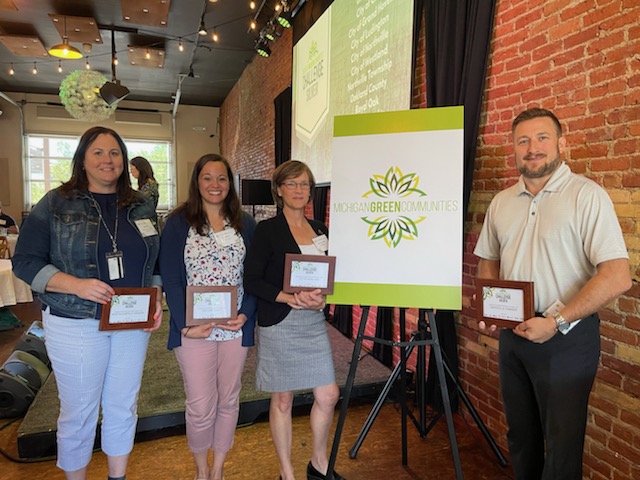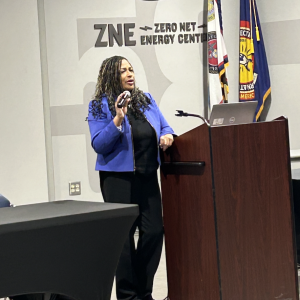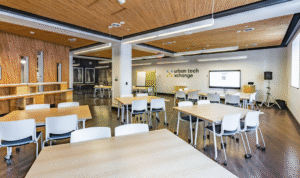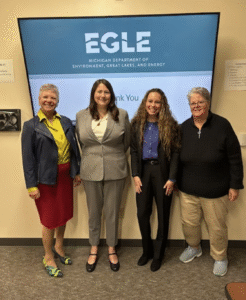
- Kim Kisner
- Community
- 02/07/2023
Since 2009, MGC has Worked to Embed Sustainability into Local Government Policies, Programs, and Operations

Established in 2009, Michigan Green Communities (MGC) is a statewide sustainability assistance program that works to embed sustainability into municipal and county operations.
MGC is a collaboration and partnership of the Michigan Economic Development Corporation (MEDC); the Michigan Department of Environment, Great Lakes, and Energy (EGLE); the Michigan Department of Health and Human Services (MDHHS); Michigan Department of Transportation (MDOT); the Michigan Department of Natural Resources (MDNR); the Michigan Association of Counties (MAC); the Michigan Municipal League (MML); and the Michigan Townships Association (MTA). It is led by a 15-member steering committee from the partners and local governments, including West Bloomfield Township, Ann Arbor, and Canton Township.
SBN Detroit spoke to Danielle Beard, Michigan Green Communities coordinator, to find out more about the work it is doing to impact sustainability initiatives in Southeast Michigan and throughout the state.
Q: What is Michigan Green Communities?
A: Michigan Green Communities (MGC) is a sustainability benchmarking, networking, and technical assistance program for municipalities and counties in Michigan. The goal is to embed sustainability in local government operations and promote innovative solutions at the local, regional, and state level.
The main component of the program is the annual MGC Challenge (that’s the benchmarking piece) where communities track in their online accounts whether they’ve completed or are in progress on a set of action items and log metrics (click here for the full list of action items and metrics).
Communities that participate in the MGC Challenge have access to free support and technical assistance programs through the MGC program and EGLE’s Catalyst Communities program.
Q: What is the impetus behind MGC?
A: There are a lot of benefits to embedding sustainability into municipal and county operations. Cost savings is a big driver for communities as they can slash their energy and water bills, helping them control the cost of their operations.
Additionally, Michigan’s weather patterns are changing drastically, and local units of government play a large role in adapting our society to these changes. Local policies and decisions can help to mitigate the effects of heat waves, severe snowstorms, massive rain events, and more.
Multiple state agencies interact with communities on different areas of sustainability. The MGC program was designed to bring those agencies together to collaborate on how to best meet the needs of local governments. And because local governments are also on the steering committee, they’re providing feedback to state agencies on the challenges they face to inform the agencies’ work.
Q: What areas of sustainability are you focused on?
A: The Michigan Green Communities program focuses on embedding sustainability into local government policies, programs, and operations.
The MGC Challenge action item categories outline this best:
- Planning for Inclusive and Lasting Impacts
- Climate Resilience and Adaptation
- Energy Efficiency & Renewable Energy
- Responsibly Managing Materials
- Sustainable Land Use & Economic Development
- Improving Health Outcomes
- Protecting & Conserving Water Resources
- Support Clean & Inclusive Mobility
- Inspire & Mobilize Residents
Q: What examples can you give of the work that’s been done?
A: Since it was started in 2009, over 100 communities have participated in various ways and taken steps to advance sustainability in their communities.
In our 2021 challenge:
- 45 communities participated representing 3.6 million Michiganders. MGC awarded 12 bronze certifications, 10 silver certifications, and 23 gold certifications.
- Over 1,500 sustainability actions were logged as complete, and over 1,000 were logged as in progress.
- The MGC Challenge added a set of metrics to track data like GHG (greenhouse gas) emissions, community water use, and more.
- We launched the MGC Accelerator Cohort to advance sustainability practices in bronze & silver MGC Challenge communities.
The current challenge is now live, and communities can report on their sustainability actions through the 2023 calendar year.
Q: What does the future look like for MGC?
A: In short, the future of MGC will involve bringing more technical assistance, resources, and templates to communities to help them expedite resiliency strategies and decarbonize their operations. This will also involve more networking among communities so they can learn from one another and not reinvent the wheel.
We launched the MGC Accelerator Cohort in January 2023, which is a group of bronze and silver-certified MGC Challenge communities that come together as a group to address sustainability issues.
The first topic that we’re focusing on is green infrastructure. Many communities in Michigan have been dealing with flooding and water runoff causing pollution, fluctuating shoreline water levels, and severe weather events. Green infrastructure solutions can help to address these issues in a way that protects man-made infrastructure and natural features.
The group will meet monthly with subject matter experts and consultants that MGC has hired to share ideas, draft ordinance language, and identify potential implementation opportunities and funding for green infrastructure projects. After the green infrastructure module, the cohort will select another topic to work on in a similar style.
The cohort is open to any community that has taken the previous Michigan Green Communities Challenge or plans to participate in the current Michigan Green Communities Challenge. This work is being funded by the MEDC.
Be sure to subscribe to our newsletter for regular updates on sustainable business practices in and around Detroit.
Kim Kisner
- All
- Business
- Community
- Education
- Events

Citizen Robotics is a Detroit-based nonprofit that advances the use of robotics and digital manufacturing in residential construction, focusing on improving productivity, sustainability, and long-term affordability. Best known for its early work in 3D-printed housing, it explores how alternative construction methods and new financial models can reduce material waste, lower lifetime operating costs, and enhance the resilience of homes. SBN Detroit interviewed Tom Woodman, founder and president of...

Detroit-based OneSix Energy is a clean-energy technology company focused on advancing a lower-carbon approach to hydrogen production. Headquartered at Newlab in Detroit, the startup is developing a proprietary methane pyrolysis system designed to produce hydrogen without carbon dioxide emissions, while also generating solid carbon as a co-product. SBN Detroit interviewed with cofounder Stefan Sysko about the company’s origins, its approach to hydrogen production, and why Detroit is positioned...

Regina Strong serves as Michigan’s first Environmental Justice Public Advocate, leading the state’s Office of the Environmental Justice Public Advocate. Her role focuses on addressing environmental justice concerns raised by communities, helping residents navigate environmental systems, and working across state agencies to improve equity in environmental decision-making. SBN Detroit interviewed Strong about the challenges communities are facing across Michigan and what environmental justice work looks like in practice....







